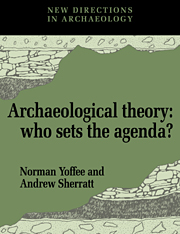Book contents
- Frontmatter
- Contents
- List of figures
- List of contributors
- Introduction: the sources of archaeological theory
- PART I THE SOCIAL CONTEXT OF ARCHAEOLOGICAL THEORY
- PART II ARCHAEOLOGICAL THEORY FROM THE PALAEOLITHIC TO THE STATE
- PART III CASE STUDIES IN ARCHAEOLOGICAL THEORY AND PRACTICE
- PART IV EPILOGUE
- 10 The relativity of theory
- 11 Archaeology: the loss of nerve
- Index
11 - Archaeology: the loss of nerve
Published online by Cambridge University Press: 03 May 2010
- Frontmatter
- Contents
- List of figures
- List of contributors
- Introduction: the sources of archaeological theory
- PART I THE SOCIAL CONTEXT OF ARCHAEOLOGICAL THEORY
- PART II ARCHAEOLOGICAL THEORY FROM THE PALAEOLITHIC TO THE STATE
- PART III CASE STUDIES IN ARCHAEOLOGICAL THEORY AND PRACTICE
- PART IV EPILOGUE
- 10 The relativity of theory
- 11 Archaeology: the loss of nerve
- Index
Summary
We begin with some notes from a hospital ward:
At midnight the police found Patient wandering on the Embankment near Waterloo Bridge. They took him to the station thinking he was drunk or drugged. They describe him as Rambling, Confused, and Amenable. Brought him to us at 3 a.m. by ambulance. During admittance Patient attempted several times to lie down on the desk…Patient was well–dressed but had not changed his clothes for some time … He is an educated man…He was talking loudly
(Lessing 1971: 9).Those are the opening words of a novel by Doris Lessing, Briefing For a Descent into Hell. It is not a novel that I like, but its theme is curiously apposite to this volume, for the man found wandering beside the Thames has experienced a mental breakdown, and the book follows his case history. Eventually the patient is identified as a Cambridge Professor of Classics. His crisis begins when he meets an archaeologist who has come to doubt whether he can know anything at all about the past: so much so that whenever he tries to lecture he is afflicted by terrible attacks of stammering. His experience has a familiar ring:
The thought he had had…struck at his confidence as an archaeologist – that was how he experienced it. That he had the equivalent of a religious person's “doubts”, and it was necessary to dismiss them before going on. […]
- Type
- Chapter
- Information
- Archaeological TheoryWho Sets the Agenda?, pp. 131 - 133Publisher: Cambridge University PressPrint publication year: 1993
- 9
- Cited by



